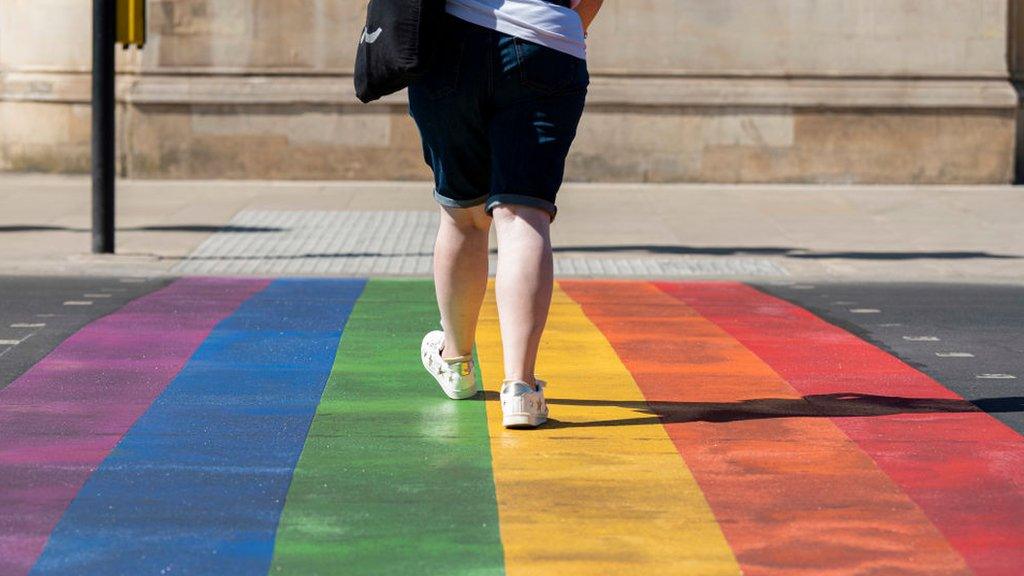Isla Bryson: What is the transgender prisoners row all about?
- Published
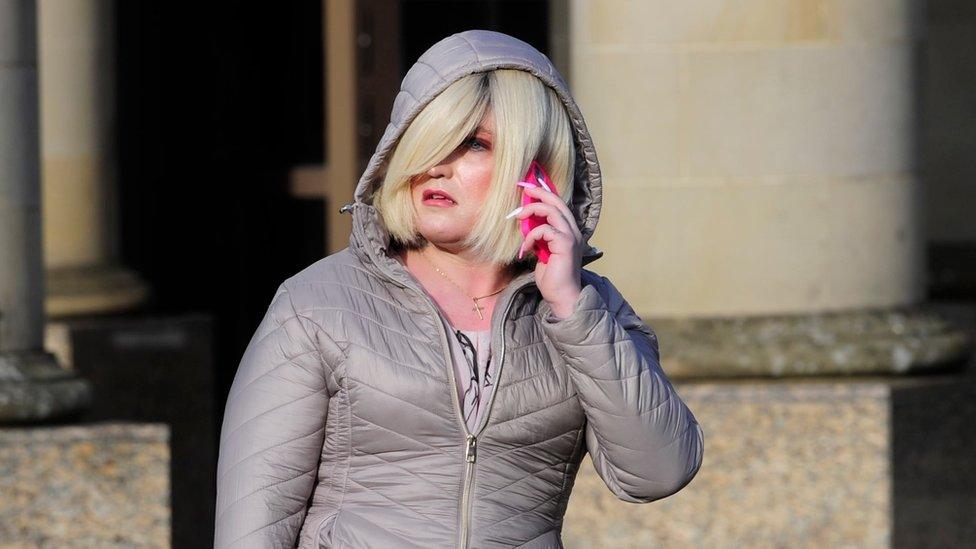
Isla Bryson is facing a custodial sentence
A transgender rapist has been jailed for eight years for attacks on two women before changing gender.
But where Isla Bryson should serve that sentence has been the subject of heated debate.
There were concerns about the safety of any women held alongside a transgender sex offender placed in a female prison.
Bryson was initially remanded to Cornton Vale women's prison in Stirling, but has since been moved to a men's jail.
It ultimately led to a review and a change in policy which will see all newly-convicted or remanded transgender prisoners initially placed in jails according to their birth sex.
Who is Isla Bryson?
Bryson, 31, was found guilty of two counts of rape at the High Court in Glasgow in January 2023.
The crimes were committed in Clydebank and Glasgow in 2016 and 2019 while Bryson was known as a man called Adam Graham.

Bryson was convicted of rapes carried out while known as Adam Graham
Police Scotland statistics will record that the crimes were carried out by a man.
Bryson made the decision to transition from a man to a woman while awaiting trial.
It is thought to be the first time a trans woman has been convicted of raping women in Scotland.
Following the conviction, Judge Lord Scott warned Bryson that a "significant custodial sentence" was inevitable.
Bryson was initially held at Cornton Vale women's prison in Stirling, but was kept apart from other inmates.
The prisoner was moved to a male wing of HMP Edinburgh two days later, ahead of sentencing in February.
How many transgender prisoners are there in Scotland?
Bryson is one of relatively few trans prisoners in Scotland.
According to the latest Scottish Prison Service (SPS) statistics, external, there were 12 trans women and three trans men prisoners between October and December 2022.
There were 7,019 male prisoners and 265 female inmates.

In England and Wales there were 230 trans prisoners at the last count on 31 March 2022, external. Of the 49 transgender prisoners in female prisons, six were trans women and of the 181 in the male estate, 162 were trans women.
New rules ban trans women with male genitalia from female prisons in England and Wales. The ban also applies to trans women who are sex offenders or have been convicted of violent crimes.
In Scotland other high profile transgender prisoners have included Katie Dolatowski, a 22-year-old trans woman who was held in Cornton Vale last year after breaching a restriction of liberty order.
In 2018 Dolatowski sexually assaulted a 10-year-old girl in a Kirkcaldy supermarket toilets, and filmed a 12-year-old girl on the toilet at a separate supermarket.
Concerns were also raised about the case of Tiffany Scott, previously known as a man called Andrew Burns, whose application to move to a women's prison was initially approved..
Scott has a history of violence and is serving an order for lifelong restriction, meaning the prisoner will only be released when no longer considered an "unmanageable risk to public safety".
It's understood that move was halted when Justice Secretary Keith Brown announced a "pause" on placing transgender prisoners with a history of violence against women in female jails.
How has the Scottish Prison Service's policy changed?
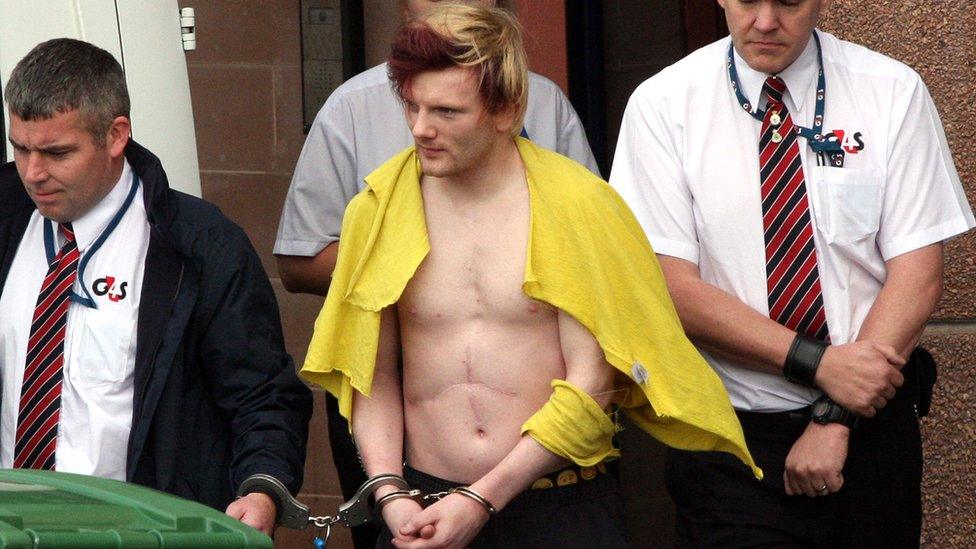
Tiffany Scott wore a ripped shirt at a court hearing in Falkirk in 2017
The prison service has said the decision on where to house trans prisoners is taken on a case-by-case basis.
Officials consider the risks posed by and to the individual, balanced with considering for the safety and wellbeing of other inmates and staff.
They could be kept in segregation before slowing integrating them into the mainstream population with "robust risk management, close monitoring and supervision".
However SPS policy states: "The accommodation provided must be the one that best suits the person in custody's needs and should reflect the gender in which the person in custody is currently living."
Prisoners are not required to have a gender recognition certificate to be considered transgender.
Bryson was kept in segregation in Cornton Vale and did not come into any contact with other prisoners, according to an urgent review of the case., external
After two days senior management decided "due to the level of risk and remaining uncertainties" to move the inmate to a male prison.
On the same day First Minister Nicola Sturgeon told MSPs Bryson would not be incarcerated in Cornton Vale "either short term or long term".
The review led to a change in policy, meaning newly convicted or remanded transgender inmates will initially be placed in jails according to their sex at birth.
And while reviews of all transgender prisoners are carried out, any trans inmate with a history of violence against women will not be relocated from the male to female estate without ministerial approval.
What was the reaction to the case?
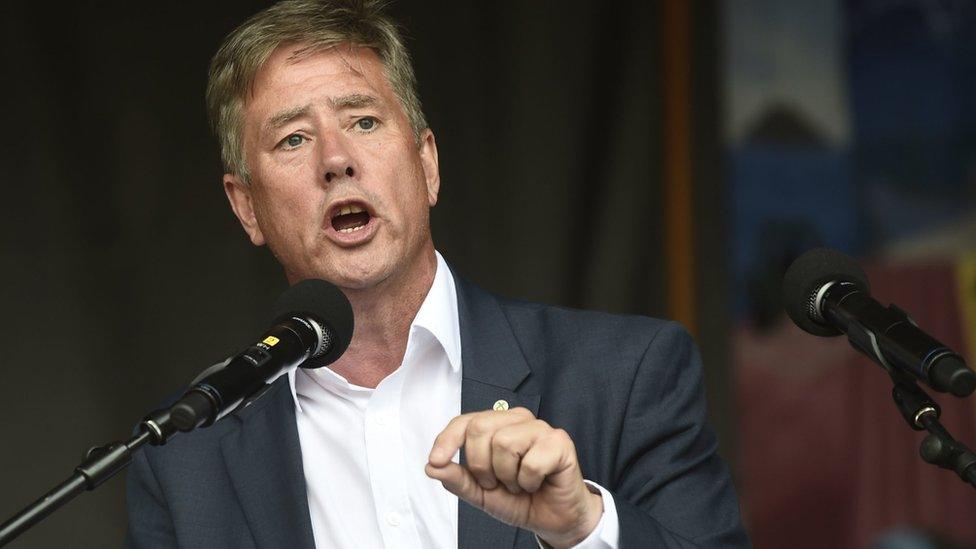
Justice Secretary Keith Brown said there would be a review
Following Bryson's conviction, Justice Secretary Keith Brown gave his backing to the Scottish Prison Service.
But within days Ms Sturgeon confirmed Bryson would not remain in a women's prison.
Mr Brown later announced an "urgent review" of the Bryson case.
The full report has not been published but it led to the change in policy on housing newly-convicted and remand prisoners.
There were also a series of recommendations, external on communication and information sharing about trans prisoners before they arrive in custody.
Ministers have insisted that the Bryson case is not connected to the recent Gender Recognition Reform Bill, external, which has not yet been enacted and has been blocked from becoming law by the UK government.
During the debate on the bill there were attempts to bar sex offenders from changing their legal sex by obtaining a gender recognition certificate. However, those amendments were defeated.
Under the terms of bill which was passed, anyone subject to a sexual harm prevention order or sexual offences prevention order would not be allowed to seek a GRC.
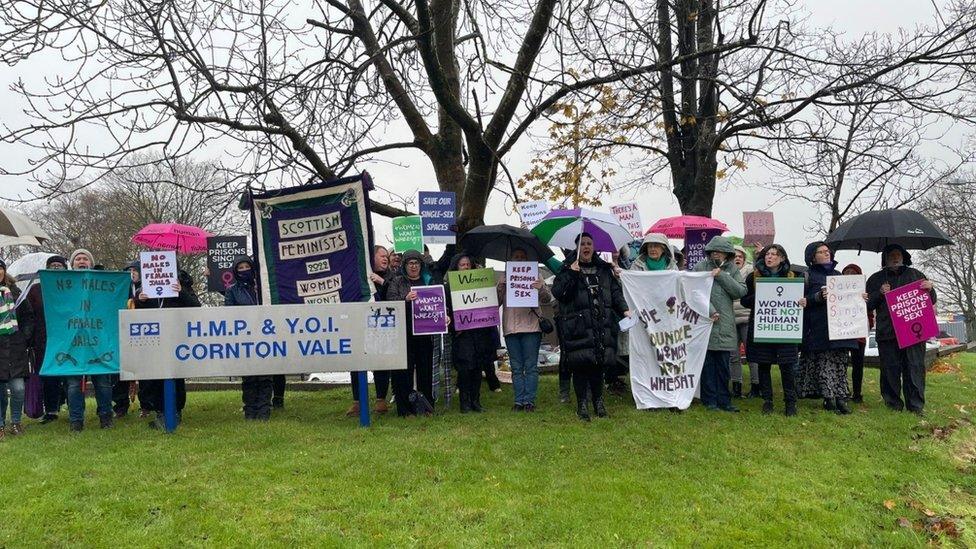
People who oppose decisions to house transgender prisoners in women's prisons protested outside Cornton Vale last year
Ahead of the decision to move Bryson to a men's prison, SNP MP Joanna Cherry said she was very concerned about the safety of women prisoners.
"To many people, it will look like this convicted rapist has gamed the system in order to try and garner sympathy, and to end up in a women's prison," she told Times Radio.
"And I think a lot of people will be shocked by that."
Campaigners have warned that female inmates are extremely vulnerable.
Kate Coleman, director of Keep Prisons Single Sex, said many had been diagnosed with mental health problems, and were likely to have experience of domestic abuse and sexual violence by men.
She said the crimes they commit which lead to them being imprisoned are often bound up with the domestic relationships with the men in their lives.
In prison, she fears that these women are "literally a captive audience" for transgender inmates.
But as well as the threat of sexual and physical violence, she is concerned about the psychological impact on vulnerable female prisoners.
"The women react viscerally to the male in their presence... there's real fear," she said.
Rape Crisis Scotland said that when deciding where to place any convicted sex offender, the priority had to be the safety of other women prisoners.
In a tweet, external, the organisation said: "It is not appropriate for someone convicted of any serious sexual offence to be placed within the general female population."
Related topics
- Published24 January 2023
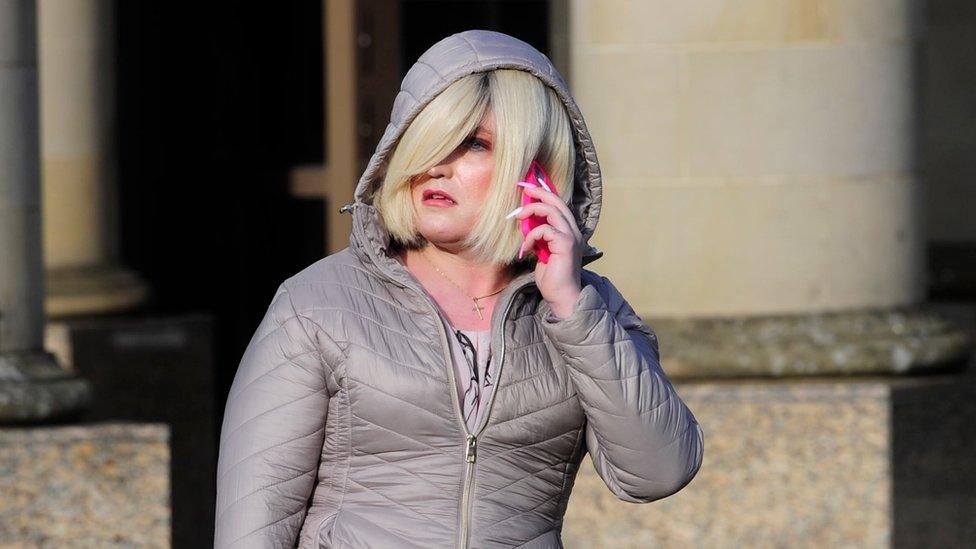
- Published23 November 2022
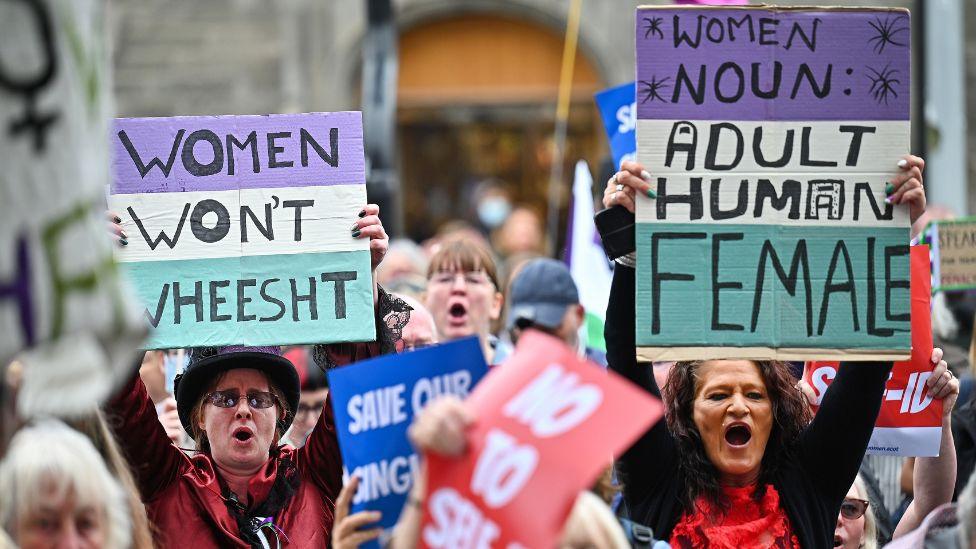
- Published8 December 2023
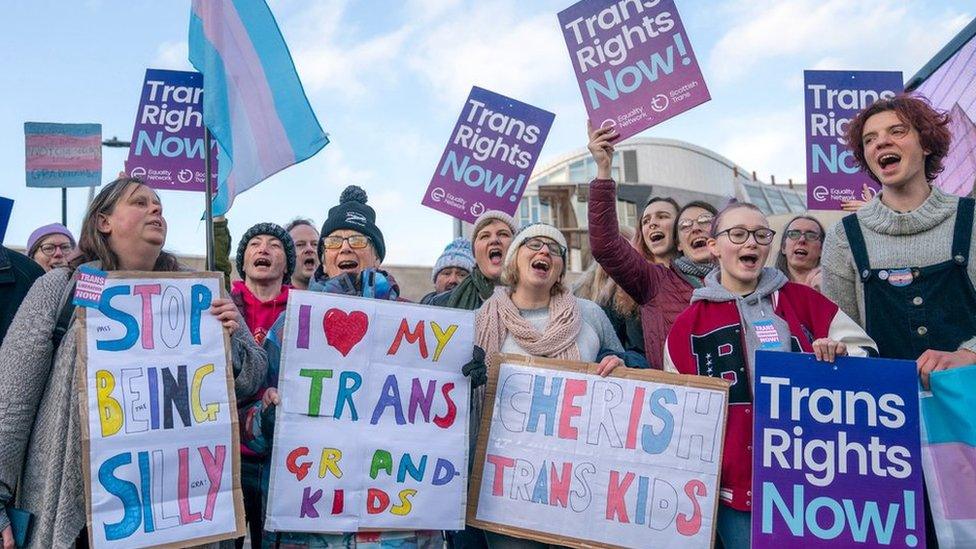
- Published16 May 2024
